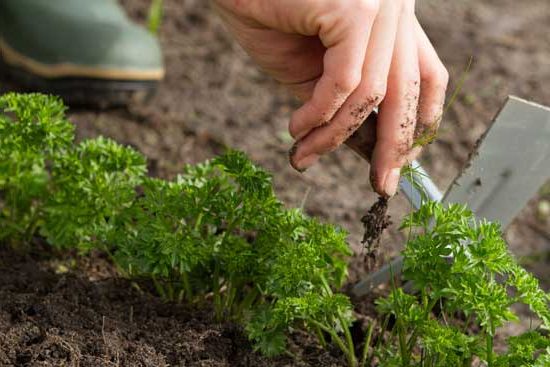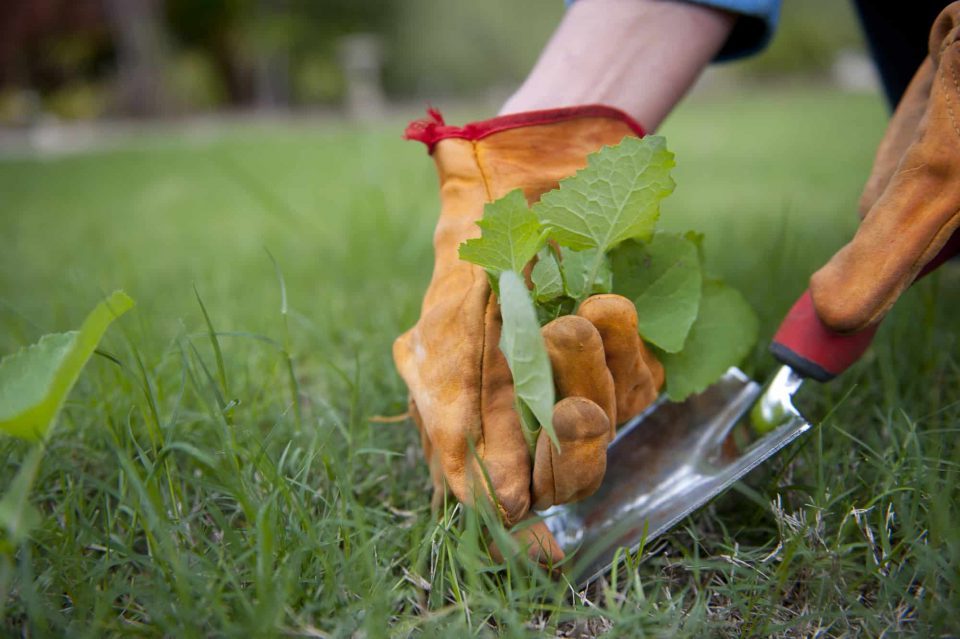Utilizing organic weed control methods can be challenging when trying to rid your yard of these invasive critters.
Weeds must be dealt with in your vegetable garden, your perennial garden, your annual garden, your lawn, your patio, in between cracks in the driveway and growing up through the cracks and crevices in your deck. They like the sun, they like the shade, they grow in dry soil, they grow in moist soil, they are an ongoing, never-ending issue!
What is a weed and what is a precious plant?
Just pull on it! If it comes out of the ground easily, rest assured it was a precious plant! 😉
Of course, every area comes with its own unique set of opportunities and challenges. There are also your own personal feelings and preferences that you have to grapple with as you decide how to proceed.
Personally, I would like to get myself to a point of gardening and landscaping in a completely organic way, including organic weed control. While for the most part, I think I have been successful, controlling weeds without herbicides can be a challenge. (Unless you have an exorbitant amount of time to pull them by hand, of course, which I don’t.)


My most favorite form of keeping these nasty little suckers at bay is using a biodegradable landscaping fabric such as newspaper, and then layering it with 4-6 inches of organic mulch. This is a preventative form of organic weed control which is very effective!
I’ve had lots of success controlling weeds in many areas of my yard using this preventative measure to eliminate the need for pesticides.
Ground Covers
Utilizing plants that function as ground covers is another method of organic weed control that is extremely effective. Ground covers are those plants that do not grow very tall, and tend to “hug” the ground, forming thick, dense mats that prevent any weed growth from happening.
Ground covers that I have found effective are Blue Rug Juniper, Lamb’s Ears, and Day Lilies. Be careful with the ground cover that you select as some are quite invasive. I have Lamb’s Ears planted next to the road at the end of my driveway.
They are one of the most resilient plants I’ve seen!
I’ve driven over them numerous times, cut them off with a lawnmower, and planted them in the most awful, gravel-filled soil I’ve seen, and they continue to thrive. They are somewhat invasive, however, and have tried to sprout up in the surrounding lawn.
Nice healthy ground covers cover an area very well which makes yearly maintenance a breeze!
Use a Fertilizer
Truly, the key to organic weed control in any yard is preventative maintenance. Once weeds are out of control, it often takes extra measures to get rid of them which may involve pesticides.
For organic weed control in your lawn, use a fertilizer such as Milorganite. It can be located near the lawn seed and fertilizer. However if you have trouble finding it, store employees should be able to assist you by simply asking for it by name.
This product is safe to use around children and dogs, and is gentle on the lawn. Plants will take in only the nutrients that are needed at the time. This product will help encourage the healthy growth of turf and other plants in the yard, which will help keep the bad stuff at bay.
More information on Milorganite can be obtained from the official Milorganite website if you’d like all the juicy details about this great product.
Vegetation Killer
Maintaining a healthy lawn will keep weeds at bay as the lawn functions as the ultimate ground cover. Where a healthy lawn grows, weeds cannot take hold!
When it comes to unwanted growth between pavers in your patio, or cracks in the cement, organic weed control can be challenging. I have used total vegetation killer, which wipes out any vegetation that it touches for up to a period of one year. I utilized the product early in the season, and all plant growth between the stone was prevented for a full year.
While the product did achieve the desired result, I can’t say that I felt good about using such a toxic product. I do have a dog and had to be extremely cautious to prevent her from walking in the area for a period of time. Also, now that I have two beautiful nieces, I would not use anything this toxic again.
If you do use this product, and end up using a watering can to spread the liquid, do not use that same watering can for any valuable plants again. Traces of the chemicals can remain in the container even once it is rinsed out and could cause damage or destruction to other plants. Such a toxic product can be dangerous to surround plants depending on the root system. If you were to pour this product into the ground, and it had contact with the root of a precious plant, tree or bush, the plant would die.
Some Type of Light Mulch
To maintain organic weed control in cracks and crevices, you’ll need to stay on top of your weeds, pulling them as they emerge. When it comes to a patio made with landscaping stone or pavers, a low growing plant such as moss can be planted between the crevices. The growth of the moss will prevent any weeds from growing as with other ground covers already discussed.
Organic weed control in the garden can be a little tricky due to the fact that you probably won’t be using a very heavy layer of mulch, if you use any at all.
However, the garden is one area that you would DEFINITELY want to employ organic weed control techniques to preserve the integrity of your fruits and vegetables.
I would recommend putting down some type of light mulch such as chopped up leaves or grass to provide a walking surface amongst the plants, and to prevent weeds from growing within the rows.
To help you control weeds in the garden, you’ll probably need one of the following garden tools: a garden hoe to hack away the young weeds on a regular basis, or a device such as the Garden weasel to turn over the soil as new growth emerges.
It is possible to turn weeds into the soil because it adds organic matter to the soil, thus improving the overall condition of the soil. As long as you get rid of weeds and seeds before they grow too big, the process should be relatively painless.
I hope this gives you some helpful information on organic weed control in your own yard.
